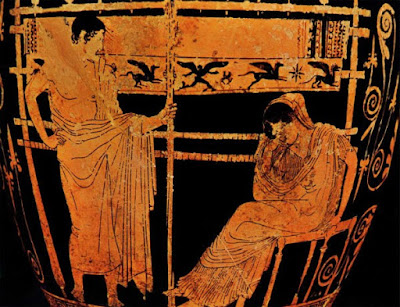So by day she’d weave at her
great and growing web—
by night, by the light of
torches set beside her,
she would unravel all she’d
done.
 |
| "Penelope, the Matchless Queen of Cunning" Leslie Peterson Sapp 16"x20" Collage, acrylic, cheese cloth, fiber paste |
Aside from the interesting literal story, this scene also taps into the archetype of Woman as Weaver, or the Weaver of Fate or Destiny. This is a universal archetype, with versions in cultures all over the world and across time.
 |
| Mayan Teotihuacan Spider Woman |
Included in my depiction is a
couple fanciful elements: The tiny ship in the deep background… could it be
Odysseus coming home? Also, the scene she is weaving is about Scylla and Charybdis,
an incident in Odysseus’ adventures that Penelope could not possibly have known
about. I thought it would be interesting to propose that maybe she is
unconsciously following her husband’s wanderings in her dreams or in her deep
creativity.
 |
| "Penelope Unravelling Her Work at Night" Dora Wheeler, 1886 Silk embroidered with silk thread |
I also like this scene because Penelope is a person who is making the best of a situation where she is almost powerless, and must use her cleverness and guile to survive. She is put
into a difficult position by her husband’s extended absence, a position that is
difficult for us to comprehend today. It displays a big difference not only in
the position of women in society and succession of kingship and property, but
also of the sacred tradition of hospitality.
To learn a bit about hospitality,
read the analysis section of cliffnotes.com or a great article about The Odyssey in one of my favorite online magazines, The Art of Manliness.
 |
| Penelope and Laertes’ Shroud. Red Figure Red Vase. S. 440 BC. |
For a description of the context of this scene, look at cliffnotes.com.
